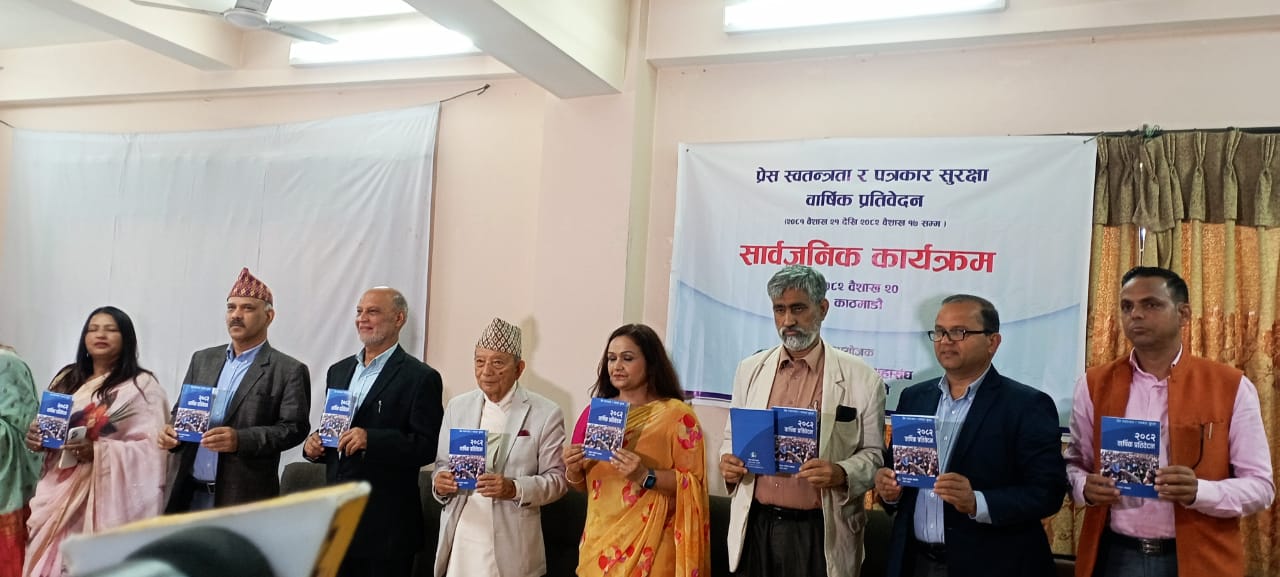
Kathmandu, May 3: The Federation of Nepali Journalists (FNJ) has called for a safe and supportive environment for journalists, emphasizing the need to protect and promote press freedom.
The FNJ urged the State and relevant stakeholders to ensure a press-friendly atmosphere. The umbrella organization of working journalists concludes that the past year—from May 4, 2024, to April 30, 2025—was a challenging period for press freedom and the safety of journalists, much like previous years.
During this period, 73 cases of press freedom violations, against 62 in 2024, were recorded, including two deaths, 16 incidents of professional insecurity, 20 assaults, and the highest 24 related to misbehaviours and threats.
These figures have been highlighted in the FNJ’s annual report titled “Press Freedom and Journalists’ Safety – 2082 BS”, launched on Saturday in Kathmandu to mark World Press Freedom Day.
According to the data presented by the FNJ Media Monitoring Unit, the highest incidents are from the Bagmati Province as 38 followed by 12 in the Madhesh, six each in Sudurpashim and Koshi, four each in Gandaki and Karnali, two in Lumbini and one has been reported from overseas.
FNJ Chair Nirmala Sharma said that press-related challenges have intensified in the changing context and that there is no ground to be confident about the state of press freedom in Nepal. She argued that the media are also unable to operate fearlessly due to behavior from both state and non-state actors. Delays in promulgating the Media Council and other media-related acts have further hindered journalists from working confidently, she said while sharing about the findings of the annual report.
She also condemned the death of photojournalist Suresh Rajak during the violent pro-monarchist demonstration in Tinkune on March 28 and the severe eye injuries sustained by TV journalist Sabina Karki. Karki was injured after being hit by a police water cannon while covering a teachers’ protest in Kathmandu on April 27.
Commitments from NHRC
Speaking at the event, National Human Rights Commission (NHRC) Chairperson Top Bahadur Magar said that press freedom is instrumental in protecting human rights. He underlined the need to guarantee both the professional and physical safety of journalists.
He stated that the NHRC is in touch with the government to establish procedures to ensure journalists’ safety and confirmed that the NHRC is investigating the death of journalist Rajak through a human rights lens. He promised an impartial investigation and full disclosure of findings.
“Even human rights activists were mistreated during the March 28 demonstration—something that did not occur even during the country’s conflict,” Magar said. He expressed concern over the rising number of press freedom violations and stressed the need for collaboration among all stakeholders to safeguard press freedom and journalists’ safety.
He also encouraged journalists to earn public trust through the responsible use of press freedom and freedom of opinion and expression.
Representing former FNJ chairs, Harihar Birahi warned that attacks on journalists ultimately threaten citizens’ supremacy and sovereignty. He stressed that it is the State’s responsibility to create an environment where journalists can work without fear.
The FNJ also shared the findings of its investigation into the death of journalist Rajak, classifying the incident as a murder. The FNJ claimed the killing was a consequence of the violent demonstrations and criticized the State and police for failing to act proactively to prevent it and ensure journalists’ safety.
On the occasion, the FNJ presented the “Gender Equality and Social Inclusion (GESI) Award” to Kailali-based Radio Tikapur FM 101 Megahertz.
The event was attended by FNJ former Chair and advisor Taranath Dahal, former Chair and Rastriya Samachar Samiti Executive Chair Dharmendra Jha, former Chair and PSB Chair Dr Mahendra Bista, Press Council Chair Balkrishna Basnet, and various journalists.
It may be noted that the global rankings by the Reporters Without Boarders-2025 show the status of press freedom has deteriorated around the world. It downgrades the global press freedom index to all-time low.
—

Happy

Sad

Wonderful

Excited

Angry